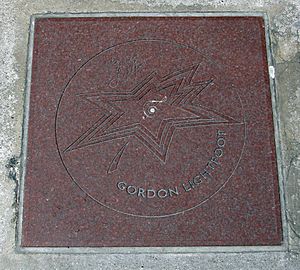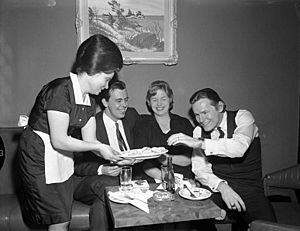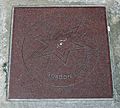Gordon Lightfoot facts for kids
Quick facts for kids
Gordon Lightfoot
CC OOnt
|
|
|---|---|

Lightfoot performing at Interlochen, Michigan, in 2009
|
|
| Background information | |
| Birth name | Gordon Meredith Lightfoot Jr. |
| Born | November 17, 1938 Orillia, Ontario, Canada |
| Died | May 1, 2023 (aged 84) Toronto, Ontario, Canada |
| Genres | |
| Occupation(s) |
|
| Instruments |
|
| Years active | 1958–2023 |
| Labels |
|
Gordon Meredith Lightfoot Jr. (November 17, 1938 – May 1, 2023) was a famous Canadian singer, songwriter, and guitarist. He became very successful around the world with his folk, folk-rock, and country music. Many people say he helped create the "folk-pop" sound of the 1960s and 1970s. He was known as Canada's greatest songwriter and a folk-rock legend.
Lightfoot wrote many well-known songs. These include "Early Morning Rain," "Steel Rail Blues," and "Ribbon of Darkness." His song "Black Day in July" was about the 1967 Detroit riot. In the 1970s, he had big hits like "If You Could Read My Mind" (1970), "Sundown" (1974), and "The Wreck of the Edmund Fitzgerald" (1976). Many of his songs reached the top of the music charts in Canada and the United States.
His albums sold millions of copies. Famous artists like Elvis Presley, Johnny Cash, Bob Dylan, and Olivia Newton-John recorded his songs. Bob Dylan even called Lightfoot one of his favorite songwriters. He said he wished Lightfoot's songs would "last forever."
Gordon Lightfoot received many awards for his music. He was made a Companion of the Order of Canada, which is the country's highest honor. He also received the Governor General's Performing Arts Award. In 2012, he was added to the Songwriters Hall of Fame.
Contents
Early Life and Music Beginnings
Gordon Lightfoot was born in Orillia, Ontario, Canada, on November 17, 1938. His mother noticed his musical talent early on. She helped him become a child performer. He first sang in public in the fourth grade. He sang an Irish lullaby over his school's public address system.
As a young boy, he sang in his church choir. His choirmaster taught him how to sing with feeling and confidence. Gordon was a boy soprano. He sang on local radio and in musical shows. When he was twelve, he sang at Massey Hall in Toronto. This was a very important concert hall.
As a teenager, Lightfoot learned to play the piano, drums, and guitar. He played concerts in the Muskoka area. He also played sports in high school. He was good at track and field and football. He even got scholarships for music at two universities.
In 1958, Lightfoot moved to California. He studied jazz music for two years at Westlake College of Music.
Starting His Music Career
While in California, Gordon Lightfoot sang on demo records. He also wrote and produced music for commercials. He was inspired by folk musicians like Pete Seeger and Ian and Sylvia Tyson. He returned to Toronto in 1960 and lived in Canada ever since.
Back in Canada, Lightfoot performed on TV shows. He also became well-known in Toronto's folk music coffee houses. In 1962, he released two singles. These songs became local hits in Toronto. He also sang in a duo called the Two-Tones.
In 1963, Lightfoot traveled in Europe. He hosted a TV show in the UK for a year. When he came back to Canada, he started to become known as a great songwriter. Other artists began to record his songs. For example, Ian and Sylvia Tyson recorded "Early Mornin' Rain." Later, Peter, Paul and Mary also recorded it.
Signing with United Artists
In 1965, Gordon Lightfoot signed a deal with Albert Grossman. This manager also worked with many famous American folk singers. Lightfoot also signed a record deal with United Artists. He started performing at big events like the Newport Folk Festival. He also appeared on The Tonight Show Starring Johnny Carson.
In 1966, he released his first album, Lightfoot!. This album made him more famous as both a singer and a songwriter. It included popular songs like "For Lovin' Me" and "Early Mornin' Rain." Lightfoot became one of the first Canadian singers to become a star in Canada without moving to the United States.
For Canada's 100th birthday in 1967, the CBC asked Lightfoot to write a song. He wrote the "Canadian Railroad Trilogy." Between 1966 and 1969, he released four more albums. His song "Black Day in July" was about the 1967 Detroit riot. Some radio stations stopped playing it. Lightfoot said they wanted songs that made people happy, not songs that made them think.
Success with Warner Bros.
Lightfoot signed with Warner Bros. Records in 1970. He had a huge hit in the United States with "If You Could Read My Mind." This song sold over a million copies. It was a big moment in his career. The album it came from was even re-released with the song's title.
Over the next seven years, he released many successful albums. These albums made him a very popular singer-songwriter. Some of these albums included:
- Summer Side of Life (1971)
- Don Quixote (1972)
- Old Dan's Records (1972)
- Sundown (1974)
- Cold on the Shoulder (1975)
- Summertime Dream (1976)
- Endless Wire (1978)
In 1972, Lightfoot had a health issue called Bell's palsy. This made part of his face paralyzed for a while. But he still had big hits. In 1974, his song "Sundown" became number one in the United States and Canada. It was his only number one hit in the U.S.
In 1975, Lightfoot read about the SS Edmund Fitzgerald shipwreck. This ship sank on Lake Superior with all 29 crew members lost. He wrote the song "The Wreck of the Edmund Fitzgerald" based on this event. It became a huge hit in 1976. It reached number two in the U.S. and number one in Canada. Lightfoot stayed in touch with the families of the lost crew members.
"Sundown" and "The Wreck of the Edmund Fitzgerald" are still played often on classic rock radio stations.
Later Career and Health
During the 1980s and 1990s, Lightfoot released more albums. These included Dream Street Rose (1980) and Shadows (1982). His music style changed a bit during this time. He moved towards a more adult-contemporary sound.
In 1987, Lightfoot sued another composer. He claimed that a song called "The Greatest Love of All" used parts of his song "If You Could Read My Mind." The case was settled, and the other composer apologized.
Lightfoot performed at the opening ceremonies of the 1988 Winter Olympics in Calgary. In the 1990s, he went back to his acoustic guitar sound. He released albums like Waiting for You (1993). He also played about 50 concerts each year.
In 2002, Lightfoot became very ill. He had emergency surgery and was in a coma for six weeks. He had several more operations. He spent months recovering at home. In 2004, he released his album Harmony. He had mostly recorded it before his illness.
In July 2004, he made a surprise return to performing. He slowly started touring again. In 2006, he had a minor stroke. This affected his right hand for a while. But he worked hard to recover. By 2007, he was able to play guitar fully again.
In 2010, a false rumor spread online that Lightfoot had died. He quickly called a radio station to say he was alive and well! He continued to tour and perform. In 2012, he sang "Canadian Railroad Trilogy" at the 100th Grey Cup event.
Lightfoot continued to tour in the United States and Canada. In 2017, he played at Canada's 150th birthday celebration. The Prime Minister, Justin Trudeau, introduced him. Lightfoot released his 21st studio album, Solo, in 2020. This was his first album in nearly two decades.
Lightfoot's Music Style
Gordon Lightfoot's music was known for his deep voice and his acoustic guitar playing. He often used a twelve-string guitar. His band members were very loyal. Many of them played with him for decades.
His band included lead guitarists like Red Shea and Terry Clements. Rick Haynes played bass for many years. Pee Wee Charles added pedal steel guitar. Barry Keane played drums, and Mike Heffernan played keyboards. These musicians helped create Lightfoot's unique sound.
Personal Life
Gordon Lightfoot was married three times. He had two children, Fred and Ingrid, with his first wife, Brita Ingegerd Olaisson. They divorced in 1973. Lightfoot said that touring made it hard to keep relationships going.
His famous song "If You Could Read My Mind" was written about his first marriage ending. His daughter, Ingrid, even suggested a small change to the lyrics.
Lightfoot had two other children, Gaylen McGee and Eric Lightfoot, between his first and second marriages. In 1989, he married Elizabeth Moon. They had two children, Miles and Meredith. They divorced in 2011.
On December 19, 2014, he married Kim Hasse.
Lightfoot stayed in shape by working out often. He said he felt like he was on "borrowed time" after his health issues. He was always ready to perform.
Gordon Lightfoot passed away in Toronto on May 1, 2023, at the age of 84. He had canceled his tour a few weeks earlier due to his health.
Awards and Honors

Gordon Lightfoot won many awards during his career. He received sixteen Juno Awards, which are Canada's top music awards. He won for best folk singer and best male vocalist many times. He also won awards for his songwriting.
In 1980, he was named the Canadian male recording artist of the decade for his work in the 1970s.
Lightfoot was inducted into the Canadian Music Hall of Fame in 1986. He was also added to Canada's Walk of Fame in 1998. In 2003, he became a Companion of the Order of Canada, the highest honor for a Canadian citizen. He is also a member of the Order of Ontario.
In 2007, Canada Post honored Lightfoot and three other Canadian musicians with special postage stamps. In 2012, he was inducted into the Songwriters Hall of Fame in New York City.
In 2015, a 4-meter tall bronze sculpture of Lightfoot was put up in his hometown of Orillia, Ontario. It shows him playing his guitar. The sculpture is called Golden Leaves—A Tribute to Gordon Lightfoot.
In 2019, a documentary film about his life was released. It was called Gordon Lightfoot: If You Could Read My Mind.
Discography
- Lightfoot! (1966)
- The Way I Feel (1967)
- Did She Mention My Name? (1968)
- Back Here on Earth (1968)
- Sit Down Young Stranger (aka If You Could Read My Mind) (1970)
- Summer Side of Life (1971)
- Don Quixote (1972)
- Old Dan's Records (1972)
- Sundown (1974)
- Cold on the Shoulder (1975)
- Summertime Dream (1976)
- Endless Wire (1978)
- Dream Street Rose (1980)
- Shadows (1982)
- Salute (1983)
- East of Midnight (1986)
- Waiting for You (1993)
- A Painter Passing Through (1998)
- Harmony (2004)
- Solo (2020)
Images for kids
See also
 In Spanish: Gordon Lightfoot para niños
In Spanish: Gordon Lightfoot para niños







